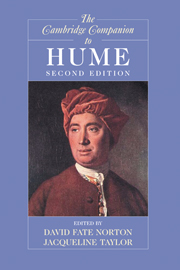Book contents
- Frontmatter
- 1 An Introduction to Hume’s Thought
- 2 Hume’s New Science of the Mind
- 3 Hume and the Mechanics of Mind: Impressions, Ideas, and Association
- 4 Hume’s Theory of Space and Time in Its Skeptical Context
- 5 Hume on Causation
- 6 Hume and the Problem of Personal Identity
- 7 Hume’s Skepticism
- 8 Hume’s Moral Psychology
- 9 The Foundations of Morality in Hume’s Treatise
- 10 Hume’s Later Moral Philosophy
- 11 The Structure of Hume’s Political Theory
- 12 Hume’s Principles of Political Economy
- 13 Hume on the Arts and “The Standard of Taste”: Texts and Contexts
- 14 David Hume: “The Historian”
- 15 Hume on Religion
- Appendix: Hume’s Autobiographies
- Selected Bibliography
- Index
- Series List
Appendix: Hume’s Autobiographies
Published online by Cambridge University Press: 28 May 2009
- Frontmatter
- 1 An Introduction to Hume’s Thought
- 2 Hume’s New Science of the Mind
- 3 Hume and the Mechanics of Mind: Impressions, Ideas, and Association
- 4 Hume’s Theory of Space and Time in Its Skeptical Context
- 5 Hume on Causation
- 6 Hume and the Problem of Personal Identity
- 7 Hume’s Skepticism
- 8 Hume’s Moral Psychology
- 9 The Foundations of Morality in Hume’s Treatise
- 10 Hume’s Later Moral Philosophy
- 11 The Structure of Hume’s Political Theory
- 12 Hume’s Principles of Political Economy
- 13 Hume on the Arts and “The Standard of Taste”: Texts and Contexts
- 14 David Hume: “The Historian”
- 15 Hume on Religion
- Appendix: Hume’s Autobiographies
- Selected Bibliography
- Index
- Series List
Summary
A KIND OF HISTORY OF MY LIFE
In the spring of 1734, Hume accepted a position with a Bristol merchant. His philosophical endeavors were not going well, and so he determined to put these “aside for some time, in order the more effectually to resume them.” As he traveled to Bristol, he wrote to an unnamed physician, probably either John Arbuthnot or George Cheyne, to ask advice about how to get on with his philosophical work. Whether Hume actually sent such a letter is not known, but the surviving manuscript furnishes us with a valuable account of the first years of his adult life. The text printed here is based on the original manuscript deposited in the National Library of Scotland, and is published with the permission of the Royal Society of Edinburgh. The title is taken from the first paragraph of the letter.
Sir
[1] Not being acquainted with this hand-writing, you will probably look to the bottom to find the Subscription, & not finding any, will certainly wonder at this strange method of addressing to you. I must here in the beginning beg you to excuse it, & to perswade you to read what follows with some Attention, [and] must tell you, that this gives you an Opportunity to do a very good-natur’d Action, which I believe is the most powerful Argument I can use. I need not tell you, that I am your Countryman, a Scotchman; for without any such tye, I dare rely upon your Humanity, even to a perfect Stranger, such as I am.
- Type
- Chapter
- Information
- The Cambridge Companion to Hume , pp. 515 - 530Publisher: Cambridge University PressPrint publication year: 2008

